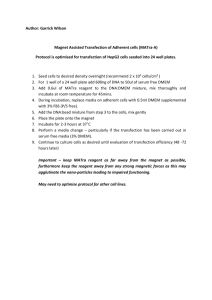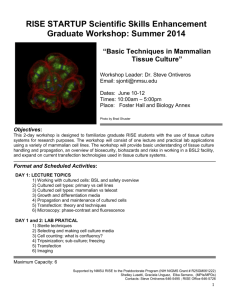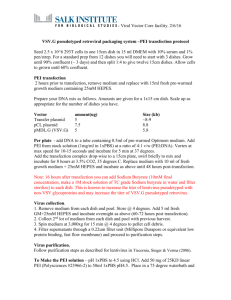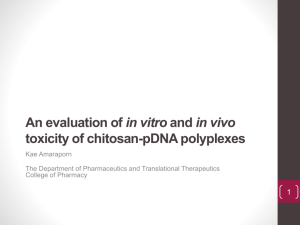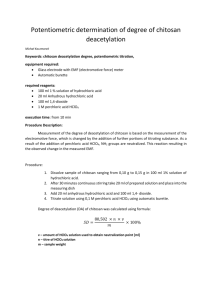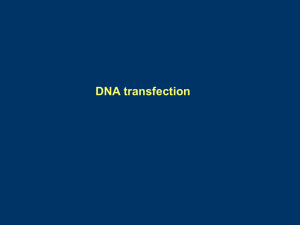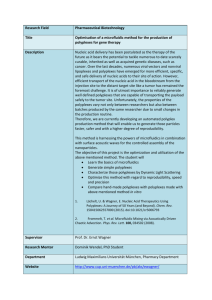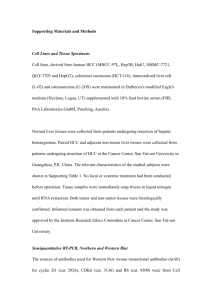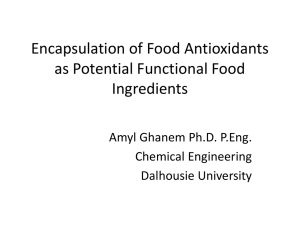materials - Springer Static Content Server
advertisement
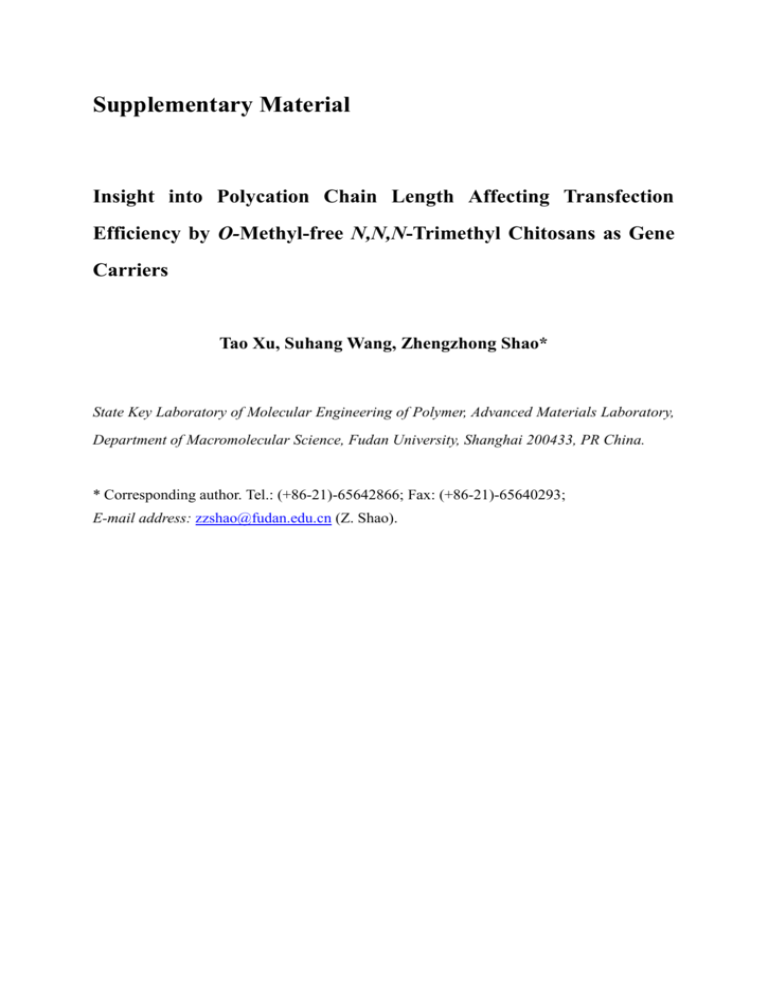
Supplementary Material Insight into Polycation Chain Length Affecting Transfection Efficiency by O-Methyl-free N,N,N-Trimethyl Chitosans as Gene Carriers Tao Xu, Suhang Wang, Zhengzhong Shao* State Key Laboratory of Molecular Engineering of Polymer, Advanced Materials Laboratory, Department of Macromolecular Science, Fudan University, Shanghai 200433, PR China. * Corresponding author. Tel.: (+86-21)-65642866; Fax: (+86-21)-65640293; E-mail address: zzshao@fudan.edu.cn (Z. Shao). Fig. S1. 1H NMR spectra of chitosan and N,N-dimethyl chitosan. (a) 1H NMR spectra of partially acetylated chitosan (chitosan-1) and completely deacetylated chitosan (chitosan-2) in DCl/D2O (2 wt%) at 293K. (b) 1H NMR spectra of DMCs from chitosan-3 at various reaction time points in DCl/D2O (2 wt%) at 293K. Fig. S2. DNA binding affinity of chitosans by gel-shift assay. Fig. S3. TE of TMC-Ps in NCI-H1299 cell and 293T cell. Luciferase expression in (a) NCI-H1299 cell and (b) 293T cell at 48 h post transfection (mean ± SD, n = 4). (c) In 293T cell, EGFP expression was imaged using a fluorescence inverted microscope at 72 h post transfection (scale bar = 50 μm). (d) In 293T cell, mean fluorescence intensity of EGFP expression was evaluated by FCM at 72 h post transfection (mean ± SD, n = 3). Statistical differences are expressed as: *, p < 0.05; **, p < 0.01; ns, no significant difference, p > 0.05. Fig. S4. LSCM images of TMC/Cy3-labeled pDNA polyplexes in COS-7 cells. The cells were imaged at 1 h post-transfection. Fig. S5. Colocalization of TMC-Ps with ER by LSCM. Blue: Hochest-labeled cell nucleus; Red: Cy3-labeled pDNA; green: ER tracker-labeled ER. MATERIALS Plasmid EGFP was amplified in E. coli and purified by Plasmid ezFilter maxi kits (Biomiga, USA). Hoechst 33342 were purchased from Dojindo Laboratorise (Japan). ER-Tracker™ dye for live-cell endoplasmic reticulum labeling kit was purchased from Invitrogen (USA). HEK293T cell was from the cell bank of Chinese Academy of Sciences (Shanghai, China), and NCI-H1299 cell was kindly provided by Dr. Ruwei Li (School of life sciences, Fudan University). METHODS Synthesis and characterization of O-methyl-free TMCs Complete deacetylation of chitosan Deacetylation of chitosan was carried out according to previous reports (1, 2). Briefly, commercial chitosan (20 g) was dispersed in 200 ml of 40% (w/w) NaOH solution containing NaBH4 (2 g) as an antioxidant. After 4 h of stirring at 110 oC under N2 protection, the mixture was filtered over a glass filter and washed extensively with deionized water until pH value to 7. This process was repeated until complete deacetylation. Finally, the products were vaccum dried at 40 oC. Synthesis of O-methyl-free TMCs O-Methyl-free TMCs were synthesized as a previous report (3) with some modifications. In details, 10 g chitosan was transferred into a 500 ml round bottom flask. Next, 34 ml 88% formic acid was added, followed by adding 40 ml 37% formaldehyde and 180 ml distilled water, yielding a total volume of about 250 ml. A reflux condenser was attached and the solution was heated to 70 oC and stirred using a magnetic stirrer for 48 h. Then, the viscous solution was evaporated under reduced pressure and 1 M NaOH solution was empolyed to increase the pH to 12 at which gel formation occurred. The gel was washed with deionized water over a glass filter to remove impurities. This process was repeated until the pH value of the filtrate decreased to 7, and then the products were washed by ethanol once. Finally, the obtained N,N-dimethyl chitosans were vaccum dried at 60 oC for 24 h. 2 g DMC was suspended in 100 ml NMP, and then 16 ml iodomethane was added. The dispersion was stirred at 40 oC for 96 h and subsequently dropped in 200 ml of an ethanol/diethyl ether mixture (50/50, v/v). The precipitate was isolated by centrifugation and washed extensively by diethyl ether. The product was dialyzed against 2 L 1% NaCl aqueous water for 3 d, then against deionized water for 3 d by changing buffer twice daily prior to lyophilization. Characterization of O-methyl-free TMCs 1 H NMR and H-H COSY spectra were measured at 298 K on a Mercury plus 400 spectrometer (Varian, USA). For chitosans and DMCs, 2% DCl/D2O was used as solvent, while for TMCs, D2O was used. Degree of deacetylation (DDA), degree of dimethylation (DDM), and degree of trimethylation (DTM) were calculated using the combined integral methods of peak areas in NMR spectra as follows: DDA% = [COCH3]/([H2,H3,H4,H5,H6,H6' ] ) × 6/3 × 100 (1) DDM% = [N(CH3)2]/([H2,H3,H4,H5,H6,H6'] ) × 6/6 × 100 (2) DTM% = ([N(CH3)3])/([H2,H3,H4,H5,H6,H6'] ) × 6/9 × 100 (3) Weight-average molecular weight (Mw) and polydispersion index (PDI) of TMCs were determined by a gel permeation chromatography (GPC) method (Water Corporation, USA) at 25 oC, using 0.5 M acetate buffer as eluent and poly(ethylene oxide) as standard to calibrate the column. The GPC was equipped with Waters 1515 pump and Water 2414 detector. TMCs were named after their original chitosans, e.g. TMC-1 was synthesized from chitosan-1. Gene expression of TMC-Ps For luciferase expression, a same procedure was used in NCI-H1299 cell and 293T cell as that in COS-7 cell. For EGFP expression, 293T cells were cultured in DMEM media supplemented with 10% FBS. For transfection, cells were seeded on 6-well plates at 2 × 105 cells/well and transfected the next day at 70-80% confluency. Prior to transfection, the culture media was removed and cells were replenished with 2 ml serum-free DMEM containing test polyplexes at a concentration of 4 μg pDNA/well. At 4 h post-transfection, the transfection media were removed, and then the wells were refilled with 2 ml serum-containing media. The cells were cultured until analysis at 72 h post transfection. Afterwards, the cells were imaged using an IX 71 fluorescence inverted microscope (Olympus, Japan). The transfection efficiency of EGFP was quantified by flow cytometry (BD FACSCalibur). Briefly, the cells were detached using trypsin/EDTA and washed twice by PBS. Suspensions were measured with excitation at 488 nm, and 10,000 viable cells were evaluated in each experiment. The mean fluorescence intensity was employed to express the transfection efficiency. Cellular uptake by LSCM Plasmid luciferase was labeled using a Cy3 Label IT tracker™ intracellular nucleic acid localization kit according to the protocol. COS-7 cells were seeded on a 35-mm glass bottom culture dish (NEST, China) at 2 × 105 cells/well and transfected the next day at ~50% confluence. Prior to transfection, the culture media was removed and cells were washed twice with transfection media, and then replenished with 2 ml transfection media containing test polyplexes formed from TMC and Cy3-pDNA at a concentration of 4 μg pDNA/well. At 1 h post-transfection, the transfection media were removed, followed by washing twice with PBS containing 0.001% SDS to remove uninternalized polyplexes from the cell surfaces (4) and then serum-free DMEM. Afterward, the cells were imaged using LSCM. Colocalization of TMC-Ps with ER. COS-7 cells were seeded on a 35-mm glass bottom culture dish (NEST, China) at 2 × 105 cells/well. At ~50% cell confluence, 100 μl Hochest 33342 solution (50 μM) was added. After culture for 20 min, the media was removed and the cells were rinsed twice with serum-free DMEM, and then the cells were replenished with 2 ml serum-free DMEM containing test polyplexes (4 μg Cy3-pDNA/well). After 40 min, the media was replaced with 2 ml prewarmed Hankʼs Balanced Salt Solution (HBSS with calcium and magnesium) containing ER-Tracker™ Green (working concentration of 1 μM). After 20 min, the staining solution was removed and the cells were washed twice with only HBSS. Afterward, the cells were imaged by LSCM. References 1. Kurita K, Shimada K, Nishiyama Y, Shimojoh M, Nishimura S. Nonnatural Branched Polysaccharides: Synthesis and Properties of Chitin and Chitosan Having α -Mannoside Branches. Macromolecules. 1998;31:4764-4769. 2. Lim S, Hudson SM. Synthesis and antimicrobial activity of a water-soluble chitosan derivative with a fiber-reactive group. Carbohyd Res. 2004;339:313-319. 3. Verheul RJ, Amidi M, van der Wal S, van Riet E, Jiskoot W, Hennink WE. Synthesis, characterization and in vitro biological properties of O-methyl free N,N,N-trimethylated chitosan. Biomaterials. 2008;29:3642-3649. 4. Forrest ML, Pack DW. On the Kinetics of Polyplex Endocytic Trafficking: Implications for Gene Delivery Vector Design. Mol Ther. 2002;6:57-66.
